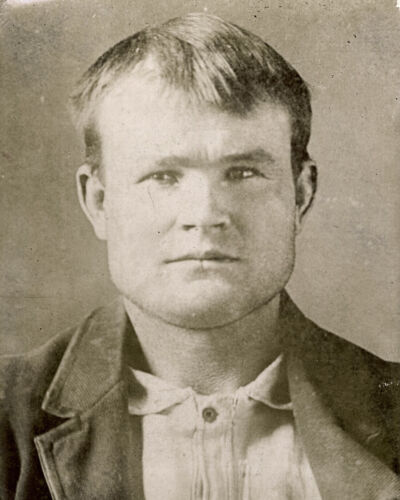|
Of all Western outlaws, none are more fondly remembered in story and folklore than the "Robin Hood of the West," Butch Cassidy--the alias of Robert LeRoy Parker. Parker was born 15 April 1866 in Beaver, Utah, and was raised by Mormon pioneer parents on a ranch near Circleville, Utah. While a teenager, Parker fell under the influence of an old rustler named Mike Cassidy. Parker soon left home to ride the outlaw trail.
For the first several years after leaving home, Parker rode the fringe between being an outlaw and a migrant cowboy. He worked several ranches as well as one time in a butcher shop at Rock Springs, Wyoming, from which he
took the name "Butch"; and to not bring shame upon honest parents, he
added the name Cassidy, most likely in respect for his old mentor. Moving
from rustler, for which he served a two-year stint in a Wyoming jail
from 1894 to 1896, to master planner of the robbery of trains, banks, and mine payrolls came naturally for Cassidy. With his quick wit and native charm, coupled with his fearlessness and bravery, he never lacked for willing companions to assist in his plans. By 1896 his gang had dubbed themselves the "Wild Bunch." This gang consisted of several well-known Western outlaws including Harry Longabaugh, known as the Sundance Kid; Harvey Logan, alias Kid Curry; Ben Kilpatrick, the Tall Texan; Harry Tracy, Elzy Lay (who was Butch's best friend), and several others. Operating around the turn of the century, Cassidy and his partners put together the longest sequence of successful bank and train robberies in the history
of the American West.
Successfully eluding the law became ever harder as the West grew more populated and law enforcement became better organized, however. When the railroads hired the Pinkerton Agency to chase down Cassidy, he and Harry Longabaugh, along with Etta Place (who was likely a Browns Park girl named Ann Bassett), went to South America and purchased a ranch in Argentina. After a few short years of trying to make it as honest ranchers, the pair again turned to easier methods of obtaining money. After robbing banks in several South American countries, the pair was finally trapped by troops in Bolivia.
What happened afterwards is the central myth surrounding Cassidy. Some claim he and Sundance were killed, others emphatically believe that another
pair of outlaws were killed by the troops and that Cassidy and Longabaugh
purposefully let it be known they had been killed. The oft-told stories
relate that the pair returned to the West and lived out their lives
under alias names and identities. Like many other Western figures, Butch
Cassidy has become larger than life. His name still generates fond recollections from many Utah old-timers who love to tell stories about him. Whether he died in South America or died of old age under one of the several identities that are attributed to him may never be fully proven.
See: Lula Betenson, Butch Cassidy, My Brother (1975); Pearl Baker, The Wild Bunch At Robbers Roost (1971); Larry Pointer, In Search of Butch Cassidy (1977); and Doris K. Burton, Queen Ann Bassett Alias Etta Place (1992).
|


